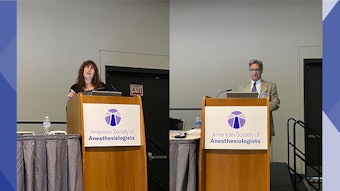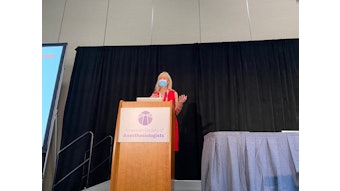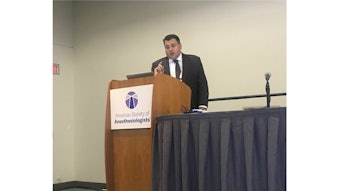Don’t Miss the REMS Opioid Session!
Understanding indications and appropriate use of opioid analgesics for patient comfort and safety.

Sunday, October 10
2:30-5 p.m.
Upper 33ABC
Make time to attend the “REMS Opioid Session: Pain Management Considerations: For the Anesthesiologist by the Anesthesiologist.” It is free and welcome to all! No registration is required. The session will be presented by Richard Rosenquist, MD, of the Cleveland Clinic, Bonnie L. Milas, MD, of the Hospital of the University of Pennsylvania, and Shalini Shah, MD, FASA, of the University of California, Irvine.
As an anesthesiologist, you have an integral role in managing pain. According to David L. Hepner, MD, MPH, FASA, Chair of the ASA Committee on Annual Meeting Oversight, “Physician anesthesiologists are leaders in the management of pain. It is essential that physician anesthesiologists understand the indications and appropriate use of opioid analgesics in order to keep patients comfortable while maintaining safety.”
Optimal pain management on the part of the anesthesiologist can translate into improved outcomes and facilitate a good experience and quality of recovery. Come see how this important session will help you refine your pain management skills.
The live workshop session will deliver a combination of traditional and personalized learning methods, including didactic presentation, interactive “What would YOU do?” case-based clinical practice questions, and interactive problem-based workshops to help address common practice concerns and barriers. You will develop a personalized action plan for incorporating your new knowledge and competence into practice.
Dr. Milas will help you improve your conversations with patients by emphasizing why “overdose prevention and co-prescription of naloxone must be part of the pain management patient discussion.” These methods will push you to more deeply engage, creating a more effective learning experience while generating a high level of actionable insights.
Dr. Shah is looking forward to a robust discussion at the session. She said, “As more and more health systems are witnessing an increase in substance use, and specifically opioid use disorder, there is a critical need for anesthesiologists to understand the perioperative implications and, more importantly, the benefits of understanding and utilizing buprenorphine in the perioperative space. Our knowledge and clinical experience with buprenorphine have grown tremendously in the last 10 years. In this REMS session, I am hoping to have a very in-depth critical discussion of newer models of perioperative care and, from a broader context, hospitalized care in the U.S.”
Invite your friends and come eager to learn! As Dr. Rosenquist puts it, “Perioperative pain management is evolving. Join us for the REMS Opioid Session to learn about contemporary pain management considerations for anesthesiologists.”
Visit Anesthesiology Today Annual Meeting Edition for more articles.











